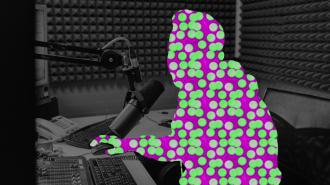The same tech behind the hugely popular ChatGPT is now being integrated into a system that automates radio DJing — but before it’s deployed, its makers and users need to ensure that the AI doesn’t spread misinformation on air.
The background: In June 2020, more than two years before it unveiled ChatGPT, AI research firm OpenAI started providing limited access to GPT-3, the language model that would later form the basis of its AI chatbot.
Like ChatGPT, GPT-3 can produce human-like text in response to prompts, and researchers quickly began using the tech to develop apps that summarized customer surveys, wrote dialogue for video games, and more.
“Using GPT-3 technology, RadioGPT creates a script for on-air use.”
Futuri
RadioGPT: Futuri, a company that designs tech to help grow media brands, has now unveiled RadioGPT, a system that uses GPT-3 and other tech to create and market tailored content for radio stations.
“RadioGPT uses TopicPulse technology, which scans Facebook, Twitter, Instagram, and 250k+ other sources of news and information, to identify which topics are trending in a local market,” explains Futuri. “Then, using GPT-3 technology, RadioGPT creates a script for on-air use.”
The script can then be read by a station’s own DJs, AI voices trained to sound like those DJs, or completely AI-generated voices, and customers have the option of creating radio shows with up to three fully virtual DJs.
“Futuri’s RadioGPT can power the entire station.”
Futuri
RadioGPT’s AI DJs can chat about weather and traffic, or look at a station’s playlist and tease upcoming songs. The system can also write blogs, social posts, and more about the content being shared on air and then automatically publish it to a station’s website or social accounts.
“Programming is available for individual dayparts, or Futuri’s RadioGPT can power the entire station,” writes the company.
Looking ahead: Futuri has created a demo page where visitors can hear what a station powered by RadioGPT might sound like. It’s already locked down a couple of partners for an upcoming beta launch and is currently looking for others to join.
“With RadioGPT’s cutting-edge language and content technologies, we can deliver a real-time, hyper-localized, innovative audio experience,” said Phil Becker, executive VP of content at beta launch partner Alpha Media. “In fact, I have such faith in AI that I had it write this quote for me.”
The big picture: Radio has a huge reach, with 80% of Americans over the age of 12 saying they tune in at least once a week. While some just enjoy the jams, nearly half of American adults say they “sometimes” or “often” get news from the radio, too.
Futuri touts RadioGPT’s ability to “share news updates and current events relevant to [an] audience’s interests and demographics,” but as we’ve seen from ChatGPT, language models are designed to create human-sounding text, which is not necessarily factual text.
The tendency of text-generating AIs to “hallucinate” or describe things that didn’t happen is a well-documented phenomenon, so OpenAI urges users of ChatGPT, for example, not to assume its accuracy and to check factual claims from the AI.
It’s not clear how Futuri plans to ensure its virtual DJs won’t get on the air and spread misinformation — but stations shouldn’t deploy RadioGPT until they or the company can ensure the worst mistake its AIs make is mispronouncing Rihanna.
We’d love to hear from you! If you have a comment about this article or if you have a tip for a future Freethink story, please email us at [email protected].






